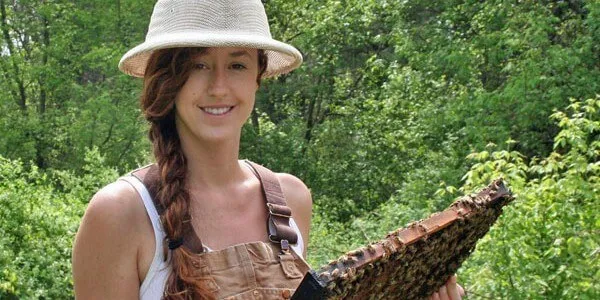Samantha Alger, a PhD candidate in the biology department in the University of Vermont’s College of Arts and Sciences, has received a 2017 Switzer Environmental Fellowship for her research focused on RNA viruses in wild bumble bees, and transmission routes of viruses between managed honey bees and bumble bees. The Switzer Fellowship comes with an award of $15,000 for academic expenses.
Alger is one of 20 2017 fellows in a program supported by the Robert and Patricia Switzer Foundation, which recognizes achievements of environmental leaders and their potential to drive positive change.
Alger, also a National Science Foundation Graduate Research Fellow, works to improve the health of managed and wild bees through research, education and outreach. In 2014, she spearheaded Vermont's involvement with the National Honey Bee Survey, a nationwide effort to gather baseline data on bee disease.
She also works with the Vermont Apiary Inspection Program to develop methods to better prioritize hive inspections and implement hypothesis driven research to understand factors driving bee health.
Committed to bridging the communication gap between researchers and beekeepers, Samantha regularly attends and presents at meetings for beekeeping organizations. With the support of these groups, she is leading a crowd-funded project to examine the role of migratory beekeeping in the spread of disease. She has provided expert testimony on bills aimed to protect pollinator species.
Prior to graduate school, Alger worked on numerous conservation initiatives and outreach projects which included monitoring federally endangered American Burying Beetles for Nantucket's reintroduction program, surveying songbirds through montane forests of the Northeast, and developing and instructing environmental education programs for both children and adults.
Her passion for pollinators began during a serendipitous beekeeping apprenticeship on Hawaii's Big Island—she now runs a small apiary at her home in Vermont.
The 2017 Switzer Fellows hail from a variety of schools and professional fields of study across many academic institutions. Fellows are supported in their interdisciplinary and collaborative work, positioning them for leadership in the nonprofit, government, business and academic sectors.
Founded in 1986, The Robert and Patricia Switzer Foundation is a grant making organization that mobilizes leaders from diverse disciplines who focus on integrated solutions to environmental problems.
